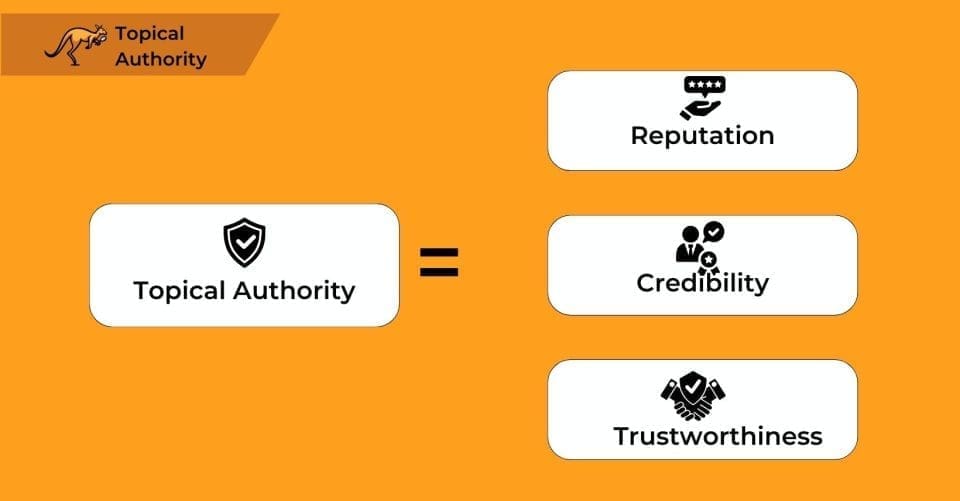In the world of SEO, topical authority represents a website’s depth of knowledge on a particular subject, which search engines use to determine ranking positions for relevant queries. Topical authority measures how a website is perceived as an expert in its niche through consistent, high-quality content creation focused on specific topics.
Traditionally, “authority” within SEO has been closely tied to link building, with the idea that links from reputable sites transfer authority. However, authority extends beyond just links. Topical authority complements link building in SEO effectiveness by focusing on content quality and relevance, which often generates natural backlinks, while link building directly influences domain authority through external validation from other websites.
Google, aiming to match users with content that effectively addresses their queries, favors sites recognized as authoritative experts.
Achieving a status as a recognized authority on a subject increases the likelihood that search engines will prioritize your content over others with only a cursory mention of the topic.
As we explore the foundation of topical authority, understanding its core—how a site’s expertise, represented by content, influences its visibility in search results—prepares us to delve into what constitutes topical authority itself.
What is Topical Authority?

Topical authority quantifies a website’s knowledge and presence on a specific subject. By consistently publishing quality articles within a niche, a site becomes a go-to resource for information on that subject, establishing its authority. Topical authority builds upon topical relevance, where relevance refers to how closely content aligns with a specific topic while authority measures the depth and breadth of expertise demonstrated across that relevant content.
This concept aligns with search engine algorithms, which prioritize sites recognized as topic experts over those with occasional, unrelated posts. Being seen as an expert increases trust from both search engines and users in the content provided.
As we examine the foundation of topical authority, it’s natural to wonder how it contrasts with another important metric: domain authority.
How is Topical Authority Different from Domain Authority?
Many people equate SEO “authority” with domain authority, which measures a site’s overall ranking potential and influence.
While enhancing domain authority is beneficial, it’s a broad indicator that assesses the entire site. Yet, SEO effectiveness is not solely about broad metrics.
A high domain authority does not guarantee high rankings for targeted subject matters if the site lacks comprehensive and reliable content on those topics.
With the importance of subject-specific authority established, it naturally leads to the question of who exactly manages and influences a site’s Topical Authority.
Who Controls A Site’s Topical Authority?
Domain authority is influenced by external interactions, but topical authority rests in your hands.
Building it requires creating focused, quality content and implementing a strategic content plan to establish your expertise.
Essentially, topical authority hinges on your site’s actions. Although the strategy has layers, the basic principle remains: produce quality content to elevate your topical authority.
As we explore how these efforts impact your site, consider the broader benefits they can introduce to your search engine rankings.
How Can Topical Authority Boost Your Rankings?
As mentioned earlier, search engines love experts. Topical authority refers to how much authority you have over a specific topic, which comes from the consistency, quality, and topical relevance of your content. Topical authority benefits SEO content planning by allowing websites to focus resources on creating interconnected content clusters that strengthen overall search visibility rather than producing disconnected articles.
Most search engines will be biased towards presenting experts when users search for something based around the topic you are targeting.
If you are regularly producing in-depth and carefully crafted content focused around the topic in question, then Google will have more of a bias towards your site – especially if you are already ranking highly for related keywords.
This basically means that having higher topical authority increases your chances of ranking for searches that are relevant to some of the content on your site. This could be a tutorial or how-to guide, a product breakdown, or even just a page of advice on getting into a certain hobby.
Search Presence
Greater topical authority means more chances to appear for related searches.
This naturally means a greater Google search presence for users with a relevant search intent, putting you in front of more users who are looking for something that your site has covered before or is highly relevant to.
Brand Awareness
Even if users do not click on your site directly, you will appear more often for relevant keywords, which means more eyes on your brand name.
Since Google and other search engines really want to push experts, you will be in a more favorable position to attract attention from new audiences.
Higher Quality content
Topical authority measures a very real shift in your site since you can’t have higher topical authority without actually being an authority on that topic.
This means that you are not only more appealing to search platforms but actually have great content to back your higher rankings up when users visit.
Overall Rankings Boosts
Topical authority is not an exclusive ranking that requires a laser focus to achieve.
You can build topical authority alongside any other SEO strategy, meaning that your higher topical authority could apply to basically any situation where a search engine is using your site’s overall quality to decide how to rank it.
How To Build Topical Authority
Building topical authority is an important part of ranking better on Google and ensuring that you get your content around to the people who are in the market to see it. Topical SEO strategies should include defining a clear niche, conducting thorough keyword research, creating pillar content with supporting articles, implementing strategic internal linking, and maintaining consistent content production that demonstrates expertise within your chosen topic areas.
However, since topical authority is entirely your own metric to control, you can’t sit back and build topical authority passively.
Having a fully-structured topical authority strategy is not always necessary if you are a smaller business, but it is still good to understand how you can establish topical authority about important topics.
For that, you need to know about topical authority and the hard work it takes to achieve it.
Define a Niche
Broad content is often at odds with what topical authority actually is.
While it is still good to make sure that most of your content is accessible (in the readable sense) for anybody who is interested, you can’t build topical relevance without a hard connection to a specific topic.
Niching down is a vital part of running any blog, article feed, or other content posting section that is being used to build topical authority. Developing topical authority for a specific industry website requires identifying the unique subtopics within that industry, mapping the relationships between these subtopics, creating comprehensive pillar content for each major area, and addressing the specific questions your industry audience frequently searches for.
A broader blog post or piece of online content might seem like it would achieve more organic traffic, but that is often not actually the case.
Consider how you use search platforms when you have a specific topic in your mind.
Would you rather go to a specialist about the subject matter or pick a random blog that seems to post about content from all across the internet with no real connection between it all?
You can’t build topical authority if your site is full of so much content that you are not focused on anything.
No matter how many times your blog posts about furniture, nobody will see your site as a furniture informational resource if the other 75% of your posts are about skateboarding and popular music.
Break That Niche Down Further
You do not want to go too niche (you at least want to have a decent audience to target), but it can be important to understand what the topical relevance of your chosen subject matter (or matters) actually is.
For example, building topical authority about furniture when you are an interior design site is reasonable, even if the furniture is only part of interior design.
This content might be varied, but it still all connects back to a particular topic set, which you can break down further for more defined audiences.
A car enthusiast blog can probably get away with trying to cover everything from repair tutorials to news about celebrity race car drivers.
However, these are all different audiences that probably want their own flavor of high-quality content.
It is your job to decide which specific audiences you target and how many of them you even want to target.
The more distinct audiences you are aiming for, the more effort you need to put into researching user intent and producing well-written content, with the payoff being even more topical relevance.
In other words, feel free to pursue more than one audience within a niche, but make sure that you still focus your content around a central “pillar” that binds them all together.
The more you broaden your focus, the less you are appealing to a known and measurable audience.
Understand Your Audience
Even before you jump into using a keyword research tool or writing up new pieces of content, you want to know who you are targeting and how.
Building topical authority requires an audience to target, so you want to take some time to figure out who you are going to create content for.
Look at search queries that trigger your site to appear in search results or relevant links in your backlink profile.
Try to get an idea of what users are searching for that leads them to your site – ideally, you want to focus on the organic traffic that is actually converting rather than just visiting.
A lot of the time, you can also fold semantically related topics into the same audience.
For example, links and keywords that are not quite the same as your top-ranking ones can still be worth considering, especially if the audience is clearly in the same kind of niche and would not be hard to target.
Explore your organic traffic reports, check your backlink profile, and try to decide who you are going to become content creators for.
You need a defined audience before you can start working on high-quality content, otherwise, your content strategy is running without any goal in mind.
Perform Keyword Research
Just like any content strategy, topical authority works best if you have keywords to use as a starting point.
Using even a basic keyword research tool can provide you with the keywords you need to properly target your intended audiences, helping you get the right kind of authority quickly.
Doing keyword research is always a good idea, no matter what your SEO project is. If you want to rank for the right terms and ensure that you are appearing when users search relevant topics, then it is important to gather up relevant keywords as early as you can.
Remember that not all keywords are going to be useful. Anything that shows a search intent that does not match your audience or is not used by enough organic traffic to be worth targeting might not be that helpful. However, you will not even know this until you start doing keyword research in the first place.
Getting a comprehensive and well-researched list of potential keywords is vital if you want to perform a content marketing strategy like this correctly.
Being a useful source of information is one thing, but you want to appear for the right people at the right times, and relevant keywords are the best way to do that.
Create a Content Strategy
Building topical authority is much easier with a defined strategy behind it, no matter the scale of the project or the content that you are focusing on. A topical SEO strategy organizes content creation around core topics and subtopics relevant to your audience and should be implemented through content mapping, keyword research, pillar content development, strategic internal linking, and regular content updates that demonstrate evolving expertise in your chosen field.
Like most kinds of search engine optimization, building a strategy around the way that you create content can be important for guiding yourself in the right direction.
Work out which queries are the ones that you should focus on first and where you would find topical authority important most often.
Even if you are targeting a range of semantically related topics and keywords, some will be more valuable than others or may require more effort to produce authoritative content.
It can often help to place similar types of content together into “topic clusters.” These topic clusters define a particular part of your audience and can often be used together to provide strong topical authority benefits because they cross over with one another.
Beyond planning topic clusters, it is also important to plan out your individual pieces of in-depth content. Not everything should be a long article with a huge amount of content depth – sometimes, you can benefit just as much from short but valuable content that answers a single question.
Above all else, it is important to try and create a long-term content plan that you can adapt at a moment’s notice.
Keyword research provides a lot of avenues for establishing topical authority, but you want to have a solid understanding of what you have and have not covered with your content so far.
Write “Pillar” Content
Pillar content, also known as a pillar page or cornerstone content, is a single piece of content that covers everything within specific topic clusters.
These are meant for establishing topical authority in a more broad niche, such as focusing on vehicles overall rather than just vehicle repair.
Pillar content is usually something long and with a huge amount of content depth, such as an “ultimate guide to X” or an “everything you need to know about Y.” These are supported with smaller articles that cover everything in that topic cluster individually.
This strategy is incredibly effective for building topical authority since it provides a central piece of authoritative content backed up by a whole host of other relevant content for each individual topic.
This can often result in high topical authority across a broader niche, spread across all of the relevant content you cover. Think of this like the spokes on a wheel. Your central content piece is the hub, with the other articles being the spokes that spread out.
As long as search engines understand that these topics are all related, their search engine algorithms can bless you with a huge amount of topical authority.
Use Internal Links
Internal links play a crucial role in establishing topical authority, functioning similarly to the connective tissue within a well-organized body of knowledge.
They not only guide search engines like Google to recognize and prioritize your most critical articles by connecting peripheral content to these pivotal pieces, but they also enhance the user experience, ensuring seamless site navigation.
For search engines, these links signal the importance of certain pages, potentially boosting them in rankings when executed correctly. This strategy not only amplifies the visibility of your key articles but also strengthens your site’s topical authority.
Furthermore, the ease of site exploration facilitated by internal links aids both search engine crawlers in indexing the site’s structure and users in finding information without confusion or frustration. In light of the importance of structure and connectivity, the creation of high-quality content becomes indispensable in reinforcing your site’s authority.
Creating High Quality Content for Building Authority in SEO
To establish topical authority effectively, you must craft content that not only meets SEO standards but also specifically enhances your topical credibility. Good content supports SEO broadly, but specialized content that bolsters topical authority requires precise alignment with your objectives and audience understanding. Essential components include optimizing for Google’s algorithm, ensuring a positive user experience, and engaging readers for more than just a fleeting moment.
Targeting your content is critical; it must resonate deeply with a well-defined audience. Such precision in audience targeting underlies the strategy for achieving topical authority, as vague or broadly-targeted content rarely succeeds in this goal. Creating relevant, high-value content that connects with a specific demographic is paramount.
Moreover, don’t overlook the power of internal linking. Effective use of internal links not only guides visitors smoothly through your site but also strategically funnels them toward desired actions or conversions. As we fine-tune these elements, we edge closer to discussing how these strategies are implemented to ensure topical authority works as intended, bridging our theoretical knowledge with practical application.
Making Topical Authority Work as Intended
Topical authority is very different from link building or creating content for social media channels.
Finding a solid starting point and following the right steps to success are vital for actually becoming recognized as one of your chosen topic’s authoritative websites.
While every single project is going to be different, there are some smaller details that need to be kept in mind. It is easy to overlook certain elements when you are focused on trying to measure topical authority, and not paying attention can hurt in the long run.
Don’t Be Too Niche
It is easy to laser-focus on a single part of your audience and ignore the rest, but this often results in you only appearing for a tiny fraction of Google’s search engine results pages.
Becoming an authority on one topic does not mean you can’t target others either.
Google uses a lot of complicated algorithms, but relevance is a major factor in almost all of them. You will always have ways to target an audience that is similar to your current target(s), even if it means producing a new stream of content that appeals specifically to them.
Being too niche just means that you force yourself into a tiny box that you can’t expand out from, which can kill your chances for expansion.
Use More Than Search Engines
Being an authority on search engines means nothing if users are not looking for you there. You also want to try and spread brand awareness in other places, especially if you have not actually been accepted by the audience as a major authority yet.
Social media platforms are a great example. Neglecting social media massively harms your brand awareness and limits the number of places that you can post, promote, or supplement your on-site content.
Measure Topical Authority Alongside Other Metrics
Whether it is keyword research changes and user experience reports to traffic data and conversions, topical authority will only help build your brand’s rankings if you are using it alongside other pieces of information.
Do not get caught up in focusing on authority when there are other metrics that need attending to, especially if they are suffering drastically and might be actively harming your rankings.
Branch Out
Focusing on one particular topic in the topical authority context does not mean you should ignore all of the others. Do not stop writing content that is meant to boost your rankings for certain keywords or earn you extra link building opportunities.
You can become an authority on a certain niche while still engaging in all of the usual keyword research, link building, and general SEO that helps sites grow beyond their own limitations. In fact, it is often something that you should be doing.
Take Extra Opportunities
There are some opportunities that are simply worth taking, even if they do not fall into your topic-based understanding of how authority works. For example, if you get a rare chance to start link building some inbound links from a major publication or brand website, it is often something worth exploring.
Not every single backlink you receive needs to be extremely relevant to your business. More often than not, something that is even vaguely relevant will be enough to confer some SEO benefits.
Keep Content Creation Coming
After securing your site’s status as an authoritative source through content creation, maintaining that position is crucial.
Regular content production, even if not revolutionary, can maintain your visibility. Not every article must integrate into an elaborate internal linking strategy aimed at a niche audience or be a keystone in your content architecture.
Often, a straightforward but helpful piece can suffice to attract additional backlinks or incrementally increase traffic.
As you explore these content strategies, you might consider whether partnering with an SEO company could amplify these efforts.
Why Should you hire an SEO company for help?

Hiring an SEO company can elevate your website’s topical authority through expertly designed strategies that align with your business goals. These firms possess deep knowledge of SEO best practices and deploy techniques specifically aimed at boosting topical authority, leveraging their experience to enhance your site’s performance in search results.
Committing to an SEO partnership means allocating the necessary resources and time, which are essential for sustained improvement. This allows you to concentrate on other critical business functions while the SEO team manages the complex, ongoing process of optimizing your website.
Staying abreast of the latest search engine algorithms is crucial, and a professional SEO company excels in adapting their strategies to these evolving standards, ensuring that your website remains competitive. They apply customized strategies that resonate with your target audience and track these initiatives with precise analytics, offering clear insights into the effectiveness of their efforts.
Choosing the right partner involves selecting a company that demonstrates a solid track record and commits to ethical practices—key factors in avoiding potential penalties that could damage your site’s credibility.
As you consider the strategic benefits of hiring a specialized team to manage your SEO, you might also explore what sets Searcharoo apart in the field of search engine optimization.
Why choose Searcharoo?
Searcharoo stands out as an excellent platform for building topical authority due to its array of features:
- Comprehensive Coverage: By covering a wide array of topics, Searcharoo enhances your authority across various subjects, as users find the in-depth content they need.
- Advanced Search Capabilities: Searcharoo’s sophisticated search tools allow users to locate precise information swiftly, increasing satisfaction and promoting repeat visits.
- Updated Content: Regular updates ensure that Searcharoo’s content stays current with the latest trends and data, thereby bolstering your reputation as a reliable source.
- User-Friendly Interface: The intuitive design of Searcharoo’s interface facilitates easy navigation, improving user experience and engagement.
- Customization Options: The customization features at Searcharoo enable users to personalize their search experience, which strengthens loyalty and your status as a trusted resource.
Selecting Searcharoo to enhance your topical authority effectively supports your credibility, attracts and retains a dedicated user base, and confirms your role as a primary source for knowledgeable content on diverse topics. As we consider these attributes, it’s valuable to also look at broader strategies that can further elevate your mastery of topical authority.
Key Strategies for Mastering Topical Authority
Topical authority is a strategy that can work extremely well in a huge range of contexts but requires planning and effort to pull off. Whether you are a small business looking to expand or an established company that wants to steal away customers from competitors, it can be something worth exploring.
Just remember that no SEO technique has a guaranteed route to success and that every business needs to tackle its marketing differently. The way you might approach topical authority could be completely different from another company in the same industry – but if it works, it works.





